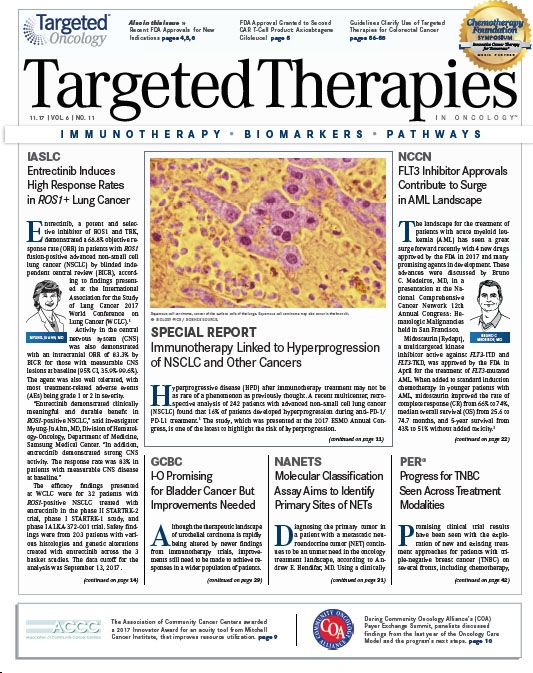The Impact and Future of Entrectinib in ROS1+ NSCLC
One of the most important effects of the positive findings for entrectinib in patients with ROS1 fusion–positive non–small cell lung cancer (NSCLC) is the potential impact on patients with central nervous system (CNS) metastases, according to Robert C. Doebele, MD, PhD.
Robert C. Doebele, MD, PhD
One of the most important effects of the positive findings for entrectinib in patients with ROS1 fusionpositive non–small cell lung cancer (NSCLC) is the potential impact on patients with central nervous system (CNS) metastases, according to Robert C. Doebele, MD, PhD.
Doebele, associate professor, Division of Medical Oncology, University of Colorado, suggested that this agent could be approved for a tumor-agnostic indication for patients withROS1orNTRKfusions, as a result of the findings from the trial.
In an interview withTargeted Oncologyduring the 2017 World Conference on Lung Cancer, Doebele discussed how the results could potentially effect these patients in the future.
Targeted Oncology:What do you see is the significance of these results?
Doebele: We now have a potentially very potent CNS-active tyrosine kinase inhibitor forROS1-positive NSCLC. In this trial, there were 6 patients evaluated thus far with CNS metastasis, and 5 of those had a response demonstrating an objective response rate of about 83%, and that’s likely what’s driving the longer progression-free survival in these patients. So now, like we have forALKandEGFR, we have a better frontline therapy for patients with ROS1-positive NSCLC.
We know that crizotinib [Xalkori], which is the current standard of care forROS1-positive NSCLC, does not have good CNS penetration. There’s very small response rates, and that drug does not allow good control of CNS metastasis. Entrectinib, on the other hand, is a very CNS-penetrant compound that is now demonstrating an excellent response rate in patients with brain metastasis. That’s not only going to allow for better control upfront of existing brain metastasis forROS1-positive patients, but also hopefully [could] prevent brain metastasis in the future.
We know that patients with lung cancer, regardless of their molecular subtype, are prone to brain metastasis, and so this is a good preventative strategy, and is likely leading to the longer progression-free survival that we’re seeing with entrectinib.
Targeted Oncology:Do you see entrectinib possibly replacing crizotinib in the ROS1-positive NSCLC population?
Doebele: Yes, I think it is very possible, in the same way that we’ve seen alectinib [Alecensa] usurp crizotinib in theALK-positive population, [due to] outstanding results from randomized trials, and in the same way we’ve seen Tagrisso [osimertinib] show better responses than Tarceva [erlotinib] forEGFR-mutant cancer. I think the emergence of this CNS-penetrant drug, entrectinib, forROS1-positive lung cancer will likely take over as the frontline agent forROS1-positive NSCLC.
Targeted Oncology:The development program for entrectinib is unique. What are the implications of this basket trial?
Doebele: The entrectinib development program is unique. Although the results being presented here only focus on theROS1-positive NSCLC population, this is a basket trial that also includes other cancers that harborROS1fusions. For example, I’ve treated a patient who has aROS1fusion with melanoma, and many other tumor types have been tested.
There’s another component to entrectinib, which is that it also is a very potent NTRK or TRK inhibitor, and so this trial was also enrolling patients with NTRK fusion-positive cancers across multiple different tumor types. And that’s a case where we see dozens of different tumor types harboringNTRKfusions, and there will likely be a push to get an indication for this drug in a tumor-agnostic label.
Targeted Oncology:How could this affect the way that molecular testing is done in the future?
Doebele: These basket trials that don’t necessarily care about tumor histology and care more about the underlying molecular genetics of the cancer, are going to change our testing paradigms. In the recent past, we’ve seen that physicians test for particular mutations in particular cancersin melanoma, [they test for]BRAFV600; in lung cancer, forALK,ROS,BRAF, andEGFR
